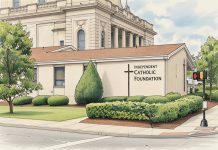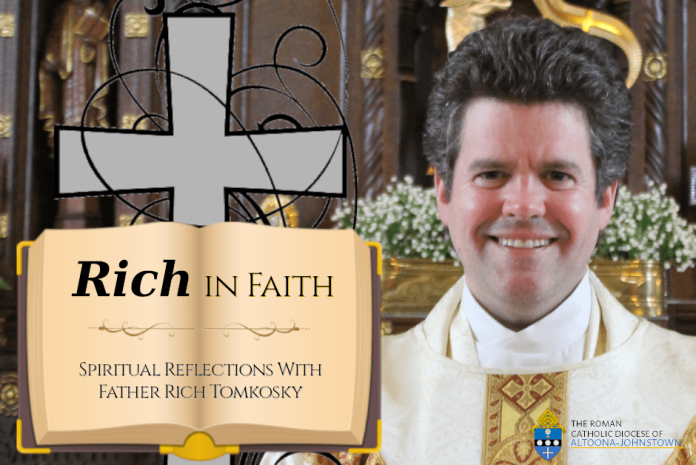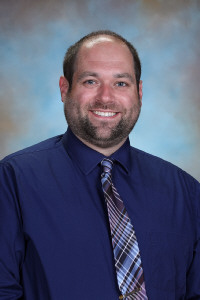By Father Rich Tomkosky
Something that is always worth repeating: no sin is beyond God’s forgiveness, if we turn back to Him in sorrow and repentance. For us Catholics that means making a good Confession of our sins in the Sacrament of Reconciliation on a regular basis, whether or not we have mortal sins. Then as we are forgiven by the Lord, we must forgive others and live a life of gratitude and penance like Saint Paul and the other saints.
Do we know the Lord on a personal level? This is so important in our time when cultural Catholicism is dying. It is no longer enough to come to Mass each week to sustain our faith; we need a daily connection to the Lord.
One of the interesting concepts that I came across in my reading is the idea that each of us relates to God somewhat differently but within one or two main ways. We come to know God as the One, the True, the Good, or the Beautiful (see the insightful book Spiritual Passages: The Psychology of Spiritual Development by Father Benedict Groeschel). What does of each of these ways of relating to God involve?
God as One
God is the one, supreme, living unity from which all life in the universe flows. Someone will be attracted to this aspect of God who is looking for integration or unity in one’s life. Some of us are tortured by inner conflict and internal contradictory or opposing forces that threaten to tear the self apart. On the outside we may be upright and responsible, but there is an inner battle that only God sees and can heal (see Saint Catherine of Genoa). Other times people can give into these dark forces, and the end result is additions to drugs, alcohol, sex, gambling (see Saint Camillus).
As Fr. Benedict Groeschel puts it so well in this regard, “If you feel drawn to God as One, you should accept this aspect of your spiritual life rather than fight it. One of the anomalies of wounded human nature is that we do not accept the very answer we seek when it is given because we have become so accustomed to pain and confusion. Many such people seem to say: ‘I am my real self only if I am in conflict with myself.’ True there is finality in the total surrender to the One which leads to the integration described in the Sermon on the Mount. For those who are called and pay the price, there is a peace that the world can never give. One must not be afraid to find it” (p. 7).
God as True
We hear that God wills everyone to be saved and come to the knowledge of the truth. If this doesn’t happen, it is on us not God – for He will do everything in His wisdom and grace to bring this about, short of canceling out our human freedom, which can be used for good or evil. Jesus told Saint Faustina that He will try one last time to reach every dying person in grave sin, but they have to say yes or are lost forever.
Those people who are attracted to God as the True are those who love to question and ponder the mysteries of life and to share their insights with others. They feel called by God as the ultimate reality, Truth itself. They are not wholly dissimilar from those who are attracted to God as the One, but the difference is Truth-seekers tend to have less inner conflict. However, if they don’t find the Truth, there is a real temptation to become disheartened, skeptical or cynical.
There is also a danger that the truth-seeker will get distracted by side paths to the ultimate Truth which is God. You see this sometimes in people with a scientific mind-set. Saint Thomas Aquinas is the counter to this: a truth-seeker if there ever was one, toward the end of his life has a vision of Jesus. After seeing the Lord Himself, Thomas said, “Such things have been revealed to me that all that I have taught and written seems quite trivial to me right now, not much more than a heap of straw.”
God as Good
Those who seek God as the Good are at once the most beloved and affectionate of human beings. They do not seem to be plagued by the inner struggle of most human beings. They are usually cheerful, compassionate and gregarious and love other people innately. However, they suffer much in a wounded world. They can be manipulated, deceived, and betrayed by others because they are the most trusting and sometimes naïve class of human beings.
Those drawn to the Good will become involved in a life of generous service, if they pursue God as the ultimate Good. If they don’t, their life can go downhill in a series of misguided relationships in which they are taken advantage of by other human beings.
Saint Francis of Assisi is really a model for one who is attracted to God as the Good. He did much good and attracted many to the faith with his sunny disposition and innate goodness. But some people even in his own religious order took advantage of him in a sad way. Listen to this quote from Fr. Groeschel: “A danger for such seekers of the good is a kind of stunned disillusionment. Or they may comfortably settle for less than the Absolute and hide from all that is ugly and damaged in this world. With good reason did Saint Francis keep his eyes on the horror of the Crucifixion of Jesus. It taught him that goodness in this world will be rejected and vilified; therefore, one must glory only in the Cross” (p. 9).
God as Beautiful
Those who seek God as the Beautiful are closely related to those who seek God as the Good. These are a complicated group because beauty indeed can be deceptive. As even Plato and the ancient Greek philosophers pointed out, we find unfailing and infinite beauty only if we pass from passing, temporary beauties to essential Beauty. The danger for this group is to settle for passing beauty and pleasure.
Saint Augustine is the model for this group, who as a young man pursued the passing pleasures and beauties of this world with a gusto unmatched by most, but only after starting on the path to conversion in Christ did he come to see the passing beauties of this world: the order of the seasons, the warmth and light of the sweet sunshine, melodies of songs, embraces of human love, and the loves of human touch and human hearts, the sweet fragrance of flowers and taste of good food and drink, as pale reflections of the ultimate beauty of God and a personal relationship with Him; even then, Augustine until the day he left this world periodically was tempted to go back to his former way of life and settle for less.
The seekers of Divine Beauty must be careful because almost every fiber of the human heart cries out for some immediate pleasure or beauty instead of waiting patiently for the ultimate beauty only found in God. But we were made for more than this passing life – we were made for Ultimate Beauty and Life with God in Heaven. Both the lover of the Good and the Beautiful will need the counterbalance of daily penance and the Sacrament of Confession to receive a divine reassurance of God’s love and forgiveness. If these are taken away, the lover of Beauty can fall into a mindless emotional religiosity or an unreligious hedonism becoming a sad clown whose smile is a mask for the tears within. (Groeschel, p.10). May we seek God with all our being! God bless you.
Father Rich Tomkosky is the Pastor of Saint Thomas the Apostle Parish in Bedford and the Pastor of Seven Dolors of the Blessed Virgin Mary Parish in Beans Cove.






























